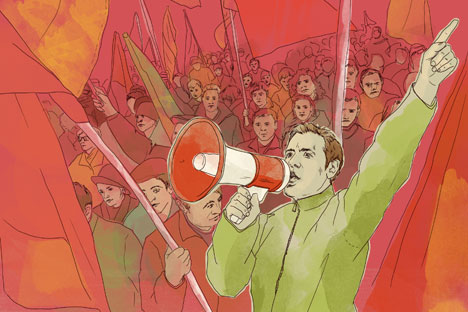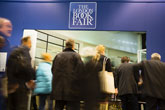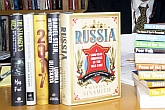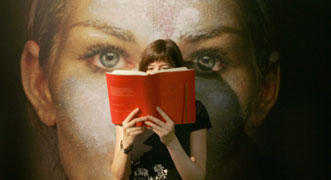Freaks and malcontents of Russia’s youth

Click to enlarge the image. Drawing by Natalia Mikhaylenko
Editor's note:
Sasha “Sankya” Tishin, and his friends are part of a generation stuck between eras. They don’t remember the Soviet Union, but they also don’t believe in the promise of opportunity for all in the corrupt, capitalistic new Russia. They belong to an extremist group that wants to build a better Russia by tearing down the existing one. Sasha, alternately thoughtful and naïve, violent and tender, dispassionate and romantic, hopeful and hopeless, is torn between the dying village of his youth and the soulless capital, where he and his friends stage rowdy protests and do battle with the police. When they go too far, Sasha finds himself testing the elemental force of the protest movement in Russia and in himself.
They were denied the stage.
Sasha looked down, his eyes tired of red flags and grey military coats. Red fluttered around them, brushing their faces, sometimes stirring the odour of musty fabric. Grey stood behind the barrier. All identical conscripts — short, grimy, weakly gripping billy clubs. The police had heavy faces, burgundy from annoyance. The indispensable officer glared defiantly at the crowd. His insolent hands on the top rung of the fence separating them, the guardians of the law and of the whole city, from the protestors. Around them stood some mustachioed lieutenant colonels, lavish bellies under their military coats. And somewhere there should also be the most important and officious of them all, the full colonel.
<…>
The fence was composed of two-meter sections along which the conscripts stood at equal intervals.
 |
| 'Sankya' will will be presented at the London Book Fair, April 8-10 |
Venka followed Sasha. Their crew gathered at the other end of the plaza, and they could already make out Yana’s voice as she lined up the formation of boys and girls.
Sasha studied the unwell and poor as he brushed up against them. Almost all of them were deeply and irritatingly old. Some sort of despair showed in their demeanour, as if they had gathered their last reserves of strength to get here and now wished only to die. The portraits that they carried in their hands and clutched to their chests depicted their leaders as younger than most of the people here. The face of young Lenin, smiling softly, an enlarged photo familiar to Sasha from his first grammar book. Then the calm face of Lenin’s successor, held up by trembling elderly hands. The successor wore a military cap and the epaulettetes of a generalissimo.
Thin newspapers printed on grey paper were being handed out. Sasha refused outright, and Venka rebuffed merrily. The scene was a simple mixture of pity and anguish. Several hundred or maybe several thousand people gathered in this plaza two to three times a year, united in the unrealistic certainty that their presence would somehow expel a government they hated. In the years that had passed since the bourgeois takeover, the torchbearers had become definitively old, and they didn’t scare anyone anymore. Then four years ago, Kostenko, a former officer and also, oddly, a philosopher, a wily and original thinker, led into the plaza a crowd of brazen and angry youths who didn’t exactly understand what they were doing among the red banners and elderly people. Within a few years, this group expanded and gained infamy for its brazen acts and noisy brawls. By now Kostenko’s party attracted so many motley youths that a metal fence was needed to contain today’s rally. So that none of them spilled out… Robust, sharp old men periodically surveyed Sasha and Venka with interest, hope, and skepticism.
A representative of the patriotic house faction shuffled in place at the podium. Even from a distance, one could make out his smooth, pink face — the face of a person who ate well, a face that set him apart from all the other grey and anxious faces gathered nearby.
<…>
Yana, raven-haired, wearing a short, elegant jacket with fur-trimmed hood and sleeves, marched up and down the ranks, looking absolutely charming. Sasha knew that she was Kostenko’s lover. Kostenko was in pretrial detention, yes, under investigation. He was arrested for buying firearms, just a few automatic rifles, and now his crew, his pack, his gang stood in nervous ranks, black headbands over their faces, foreheads sweaty, eyes bewildered. They came from all over the country. Youthful outsiders, freaks, malcontents united by who knew what, maybe just some black mark placed on them at birth. Matvey, who led their faction in Kostenko’s absence, was not among the ranks today. He stood on the sidelines, watching. Yana lifted the megaphone to her face and raised her arm. Her voice was swallowed by the collective scream that answered it, and only her very first rolling, sonorous syllable remained. Having not yet found his place, Sasha stood near the ranks, his mouth wide open. In his peripheral vision, he could see the frightened pigeons leaving the tarmac, an officer twitching nervously, the sluggish hands of the conscripts standing near the fencing as they fondled their batons. As Sasha shouted along with the others, his eyes filled with that requisite void, which, throughout the ages, always precedes an act of violence. They were seven hundred souls, and they screamed the word “Revolution”.
“Tishin!” They waved Sasha over. “Come here!” He joined the left front rank next to Venka, whose hungover eyes, previously doughy, were now red, almost burnt, as if they had been sautéed in a piping hot skillet. “Go away, granny!” Venka laughed. An old lady stood near the formation, and Sasha heard her voice in the brief pause between shouting: “Fools! Provocateurs! Your Kostenko goes to prison to become famous! The Jews brought you here!”
Yana walked by, not paying any attention to the old lady, her face bright and exposed, like an open fracture. “Heathen!” screamed the old lady into her face, but Yana was already walking away indifferently. Granny’s sharp eye found Sasha. “The Jews brought you!” she repeated. “You’re a Jew! A Jew and a Nazi!” Sasha was gently nudged in the back by those standing behind him, and the formation began to move. The chant “Re-vo-lu-ti-on!” trembled and vibrated across the whole plaza, overpowering the deep voice from the stage, the police radios, and the voices of the other protesters. “Founding Fathers”! Guys!” The voices from the stage appealed to them. “You didn’t come here to scream! Let’s behave ourselves…” The formation waved red and black flags and moved past the stage in the direction of the enclosure. The screaming was loud enough to puncture eardrums.
<…>
The other sounds in the plaza fell into a rhythm with this scream, the squeal of the metro doors, the conscripts fussing with their grey military coats, the hiss of portable radios, the honks of car horns.
“Love and war! Love and war!” “Love and love!” Sasha improvised, when he caught another glimpse of Yana as she turned sharply in front of the first rank, her jacket’s hood rising and falling.
<…>
“You’re ruining the rally,” a woman screamed and tried to grab Yana by the sleeve. “Founders!” the woman said, trying to look into their eyes. “You call yourselves ‘Founding Fathers’! What are you founding? You’re destroying, that’s what you’re doing!” “Did you come here to protest? In this paddock?” Yana asked her, removing the megaphone from her face. “Go ahead and protest. We’re leaving now.” They were already standing near the railing, and Sasha could see the shifty eyes of the policemen and the officer, who was yelling into the portable radio.
“Yes,” he shouted. “Send in the OMON. These fucking FF are coming through.” “We are maniacs and we will prove it,” shouted the formation in chorus, devoutly, on key, stamping their feet and waving their flags. Venka turned to face the formation, his back to the police and the enclosure, and he quickly distributed the firecrackers to the next rank. “Fire ’em up!” The stage went silent; everyone was looking at the mass of chanting protestors. Several firecrackers blew at once, an explosive bag flew at the police next — it plopped down next to a frightened officer, spitting out dirty smoke. Sasha saw one officer’s cap fall off when he, confused by what was happening, turned and ran away. “Re-vo-lu-ti-on!” The voices resounded, nearing a hysterical pitch, as the formation stamped along in their trainers and worn combat boots.
Several fireworks lit above the protestors at once. Sasha already had his hands on the fence and pulled it towards him. From the opposite side, a policeman frantically held onto it. Another swung a club at Sasha’s head. Sasha let go, ducked, and then, carefully, as if it were hot, took hold of the fence again. The officer shifted the club to his other hand and landed a sideways blow on Venka’s cheek, which immediately erupted in a puffy, crimson welt.
“The staff,” Venka yelled, looking back with a demonic smile. “Give me the staff!” Someone passed him a flag. Venka tore off the material and powerfully swung the staff at the officer, who was busy shoving his club into someone else’s face and didn’t see it coming. The officer’s cap slid down the back of his head, and the blood began to flow in a thin stream down his forehead to the bridge of his nose, where it parted and spread in a canopy across his brow, cheeks, and eye sockets. The officer looked up, his eyes bulging, as if trying to see the wound.
Another staff landed on Sasha’s shoulder; the flag flapped. Out of the corner of his eye he saw the other flags on other shoulders, like spears, their tips pointing at the policemen and the conscripts holding together the enclosure. Again, Sasha was pushed from behind so strongly that he fell forward, and as he fell, he pushed his hands into the chest of a conscript who held his club up and began to blink anxiously — either he didn’t know how to swing it or he was too afraid. Sasha managed to stay on his feet, pushed the conscript away, and lifted the section of enclosure above his head. The tirelessly screaming mass broke through the pen. The policemen backed away, staring at the protestors. Someone led the officer with the busted head towards the police car.
<…>
Sasha understood that the cops had been able to block off some of the protestors after the initial break — he saw that fewer of them were left, possibly only about two hundred people. Many of them were already escaping into the inner courtyards, understanding that the free-for-all would not last forever. “Pigs,” someone screamed, and the horde tore up the street, dropping rubbish bins and crashing merchants’ stalls. There was the continuous din of broken glass. The city’s mixed-up and finely ground colors became unusually bright that morning. Journalists with camcorders ran along with the crowd — businesslike, and, it seemed, maybe even happy about what was happening.
Translation by Mariya Gusev and Jeff Parker with Alina Ryabovolova. Courtesy of Dzanc Books' DISQUIET imprint and Glagoslav Publications in cooperation with www.nibbe-wiedling.com.
All rights reserved by Rossiyskaya Gazeta.
Subscribe
to our newsletter!
Get the week's best stories straight to your inbox



